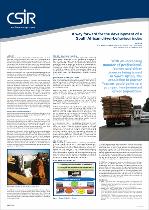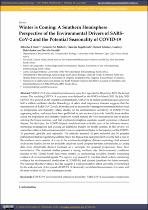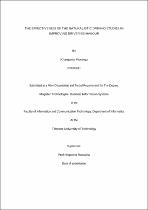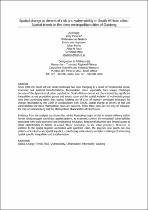JavaScript is disabled for your browser. Some features of this site may not work without it.
- ResearchSpace
- →
- Research Publications/Outputs
- →
- Conference Publications
- →
- View Item
| dc.contributor.author |
Venter, Karien

|
|
| dc.date.accessioned | 2010-09-02T14:00:04Z | |
| dc.date.available | 2010-09-02T14:00:04Z | |
| dc.date.issued | 2010-09-01 | |
| dc.identifier.citation | Venter, K. 2010. Way forward for the development of a South African driver-behaviour index. CSIR 3rd Biennial Conference 2010. Science Real and Relevant. CSIR International Convention Centre, Pretoria, South Africa, 30 August – 01 September 2010, pp 1 | en |
| dc.identifier.uri | http://hdl.handle.net/10204/4324 | |
| dc.description | CSIR 3rd Biennial Conference 2010. Science Real and Relevant. CSIR International Convention Centre, Pretoria, South Africa, 30 August – 01 September 2010 | en |
| dc.description.abstract | Road safety is a core problem that governments battle with year after year. One of the areas in which South Africa has been lagging behind is the field of road and traffic psychology. This is despite the fact that some 90% of road accidents are considered to be due to human error. Still, little South African research has been performed to understand and consequently alleviate the problem. Approaches to addressing road-user behaviour on South African roads appear not to be correctly modelled to address the problem. Research has indicated that driver-psychology research should be heading for an “intelligent, knowledge and rule-based model”, which will explain driver behaviour within the context of a wide range of realistic and complex situations. One way of addressing the need is to develop a driver-behaviour classification system that will enable researchers to better understand driver behaviour within the South African context. Internationally, road-user behaviour classification is not a new concept and both subjective and objective methodologies have been utilised to develop general road safety and individual road safety risk-behaviour indexes. A problem with this type of research is that it has become expensive, labour intensive and often impractical to use observers and interviewers to obtain information. To solve this problem, the collection of driver-behaviour information should be automated. Internationally, an approach called naturalistic driving studies (NDS) has been employed to collect electronic data of volunteer drivers. NDS refers to the unobtrusive approach to study driver behaviour specifically. This methodology is new and will enable South African researchers to study driver behaviour in the context of the driving task and road environment, as well as inform driver actions preceding accidents or near-accident events. | en |
| dc.language.iso | en | en |
| dc.publisher | CSIR | en |
| dc.subject | Professional drivers | en |
| dc.subject | Learner drivers | en |
| dc.subject | Driver licences | en |
| dc.subject | Learner licences | en |
| dc.subject | Inexperienced driver population | en |
| dc.subject | Traffic psychology | en |
| dc.subject | Road safety | en |
| dc.title | Way forward for the development of a South African driver-behaviour index | en |
| dc.type | Conference Presentation | en |
| dc.identifier.apacitation | Venter, K. (2010). Way forward for the development of a South African driver-behaviour index. CSIR. http://hdl.handle.net/10204/4324 | en_ZA |
| dc.identifier.chicagocitation | Venter, Karien. "Way forward for the development of a South African driver-behaviour index." (2010): http://hdl.handle.net/10204/4324 | en_ZA |
| dc.identifier.vancouvercitation | Venter K, Way forward for the development of a South African driver-behaviour index; CSIR; 2010. http://hdl.handle.net/10204/4324 . | en_ZA |
| dc.identifier.ris | TY - Conference Presentation AU - Venter, Karien AB - Road safety is a core problem that governments battle with year after year. One of the areas in which South Africa has been lagging behind is the field of road and traffic psychology. This is despite the fact that some 90% of road accidents are considered to be due to human error. Still, little South African research has been performed to understand and consequently alleviate the problem. Approaches to addressing road-user behaviour on South African roads appear not to be correctly modelled to address the problem. Research has indicated that driver-psychology research should be heading for an “intelligent, knowledge and rule-based model”, which will explain driver behaviour within the context of a wide range of realistic and complex situations. One way of addressing the need is to develop a driver-behaviour classification system that will enable researchers to better understand driver behaviour within the South African context. Internationally, road-user behaviour classification is not a new concept and both subjective and objective methodologies have been utilised to develop general road safety and individual road safety risk-behaviour indexes. A problem with this type of research is that it has become expensive, labour intensive and often impractical to use observers and interviewers to obtain information. To solve this problem, the collection of driver-behaviour information should be automated. Internationally, an approach called naturalistic driving studies (NDS) has been employed to collect electronic data of volunteer drivers. NDS refers to the unobtrusive approach to study driver behaviour specifically. This methodology is new and will enable South African researchers to study driver behaviour in the context of the driving task and road environment, as well as inform driver actions preceding accidents or near-accident events. DA - 2010-09-01 DB - ResearchSpace DP - CSIR KW - Professional drivers KW - Learner drivers KW - Driver licences KW - Learner licences KW - Inexperienced driver population KW - Traffic psychology KW - Road safety LK - https://researchspace.csir.co.za PY - 2010 T1 - Way forward for the development of a South African driver-behaviour index TI - Way forward for the development of a South African driver-behaviour index UR - http://hdl.handle.net/10204/4324 ER - | en_ZA |









